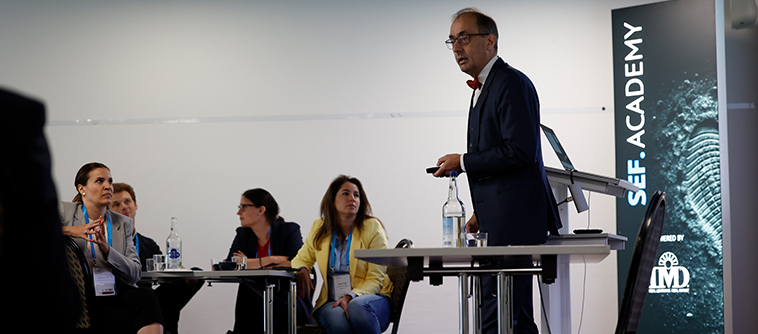“Climate change and social issues such as inequality are the defining problems of our time, and these will stay with us. Not just for a couple of years, as hot buzz words, but for decades to come,” said IMD Professor of Finance Karl Schmedders.
Schmedders was speaking at the third annual gathering of the SEF Academy, a day-long event organized by the International Institute of Management Development (IMD) as part of the Swiss Economic Forum’s (SEF) annual conference. The participants, aged 28 to 42, convened in Interlaken to grapple with the risks, challenges and opportunities that will arise from future regulation.
The aim of the workshop was to look beyond the current hype around environmental, social and governmental (ESG) issues and examine the economic incentives that contribute to greenhouse gases, as well as the upcoming regulation that will impact all businesses, whatever their size and industry.
“I hope the participants will understand that their companies need to do more. They need to get ready for more regulation coming their way that will change the parameters of how they do business,” said Schmedders.
Conversations with clients
The young leaders ranged from executives at private banks, insurers and industrial companies to CEOs and CMOs of start-ups and family-owned businesses. Away from the daily demands of their roles, participants were able to reflect on the scope and scale of ESG initiatives within their own organizations.
“One lesson that I will take away is that smart companies will start to invest today,” said Ina Maria Walthert, Head of Sustainability at Swiss automotive group AMAG.
Other participants praised the event for giving them the tools and arguments they needed to speak seriously about ESG issues both internally and with customers.
“I come from the private banking industry covering ultra-high-net-worth individuals based in the Middle East, where the awareness of ESG in finance is quite low,” said Fouad Boustany, an Executive Director at Vontobel. “I truly believe that the impact or inclusion of ESG into finance and the allocation of investments would have a benefit for all investors.”
The mother of all externalities
The workshop focused on the economics of climate change, including the current state of global carbon pricing initiatives and the reporting of Scope 1, 2 and 3 emissions. The lack of pricing for negative externalities such as melting glaciers, forest fires, and flooding, is a massive market failure, said Schmedders.
Also discussed was the so-called “tragedy of the horizon”, a term popularized by former Bank of England Governor Mark Carney, describing the disconnect between the short-term focus of most CEOs and politicians with the long-term consequences for the planet of the greenhouse gas emissions produced today.
One solution is aligning pay with progress on sustainability by giving all employees, not just the C-suite, incentives for meeting ESG goals, said Schmedders.
Another issue is that too much focus is put on ESG as risk management issue with not enough attention paid to the business opportunities for companies facing the green transition.
“Everyone worries that it will cost too much money,” he said. “It’s not just risk management. The question is whether this can this have a positive impact on your company’s growth because you are better than your competitors.”
IMD is the academic partner of the SEF, which sees some 1,250 leaders from business, academia, politics and the media meeting to exchange ideas and to perform cross-industry networking.
This year’s speakers include Christiana Figueres, who was the Executive Secretary of the United Nations Framework Convention on Climate 2010-2016, and Kevin Rudd, the former Prime Minister of Australia.


